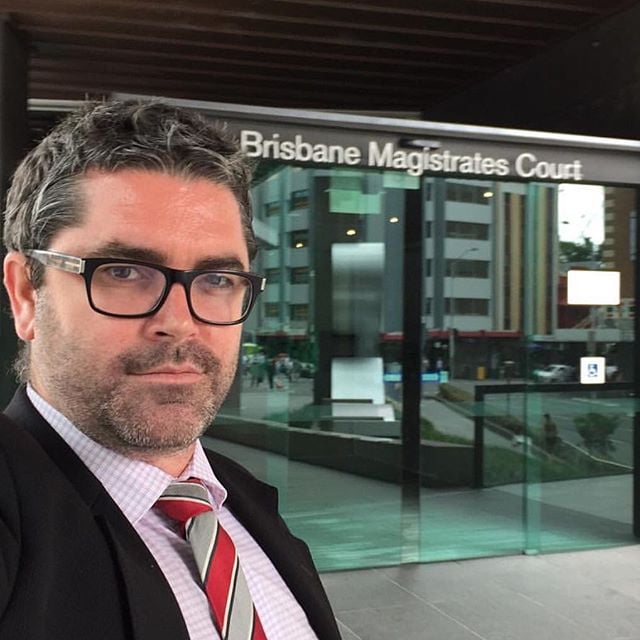

I appeared at Brisbane Magistrates Court again yesterday, to represent a client charged with their third Drink Driving offence in 5 years, being their fourth in total, as well as driving a vehicle without an Interlock when required.
My client's blood alcohol concentration for yesterday's matter was 0.146, and the readings for their three previous offences were 0.105, 0.161 and 0.150.
My client had also been twice previously charged with Disqualified Driving.
Given my client had 2 previous DUI convictions within the last 5 years, and given one of those was a High Range offence, every vehicle which they operate within the first 12 months after regaining their licence must have an Interlock device installed.
An Interlock device is effectively a breathalyser hardwired to the persons vehicle, which prevents the vehicle from starting unless breath containing zero blood alcohol is blown into it.

Given my client had lost their licence twice within the 5 years prior, and given one of those was a High Range offence, they were not eligible to apply for a Work Licence.
My client faced a maximum penalty for their DUI offence of a lifetime driver’s licence disqualification, 9 months imprisonment and 28 penalty units.
For failing to have an Interlock device installed, my client faced a further lifetime driver’s licence disqualification and 28 penalty units.
My client also faced a Mandatory Minimum licence disqualification of no less than 9 months for the Drink Driving offence, plus 3 months for not having an Interlock installed, being a total Mandatory Minimum of no less than 12 months.
Magistrates have a general power to impose up to a lifetime driver’s licence disqualification, above and beyond any legislated disqualification ranges.
A penalty unit in Queensland is currently valued at $113.85.
Further, persons who plead or are found guilty in the Magistrates Court must pay the Offender Levy, which is presently worth $107.10.
When deciding how to deal with a Repeat DUI offender, the courts have a number of options available.
Magistrates will hand down a Probation order in circumstances where they are persuaded that the offender needs help, rather than, or in addition to, punishment.
Persons on Probation must report to the Probation & Parole office during their ordered period, and engage in any required counselling or mental health treatment.
Probation is more of a supervisory order than a form of penalty.
Probation orders can only be made with the consent of the offender.

A suspended term of imprisonment means that the client does not actually go to jail, but the term of imprisonment hangs over their head for a set period.
If the person returns to court for any other offence punishable by imprisonment during the set period, which a lot of seemingly minor offences are, the Magistrate has 2 options.
The Magistrate can either extend the length of the suspension period, in other words extend the period during which the term of imprisonment hangs over the person’s head, or activate the term of imprisonment.
Alternate to a suspended term of imprisonment, the Magistrate can hand down an intensive correction order, impose a term of imprisonment with immediate parole, or incarcerate the person by physically sending them to jail for a period.
An intensive correction order is a form of imprisonment which is served within the community.
Persons on an intensive correction order must report to the Probation & Parole office during their ordered period, and comply with any directions given.
If a person breaches an intensive correction order, by committing another offence or failing to comply with any given directions, they will be brought back before the court and resentenced for their original offence.
Imprisonment with immediate parole means that the client does not physically go to jail, but technically according to their record they did, however their court date is their release date.
Persons on parole must also report to the Probation & Parole office during their set parole period.
If a person breaches parole, by committing another offence or failing to comply with any given directions, they will be immediately imprisoned for the remainder of their prison term.
I drafted detailed and comprehensive written submissions of the relevant legislation and case law.

I drafted substantial Affidavit materials for my client to sign which spelled out in detail the lessons which they told me they had learned.
I made comprehensive verbal submissions to the Magistrate.
I had my client obtain multiple character references, based on a template which I had earlier provided.
I had my client attend a reformatory course which went some way to show the Magistrate that my client was serious about educating themself on the error of their ways.
I was able to persuade the Magistrate not to hand down any type of imprisonment, and that an order of Probation was appropriate.
My client received a total 13 month licence disqualification, along with a 9 month Probation order.
Needless to say, my client was extremely relieved.
Wiseman Lawyers specialise in Drink Driving and Traffic Law.

Regards
Andrew Wiseman, Wiseman Lawyers
Ph: 1300 947 352
andrew.wiseman@wisemanlawyers.com.au
wisemanlawyers.com.au
Click here to read about other clients I have helped:






